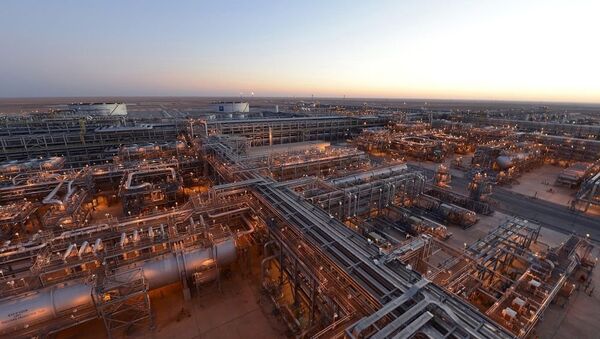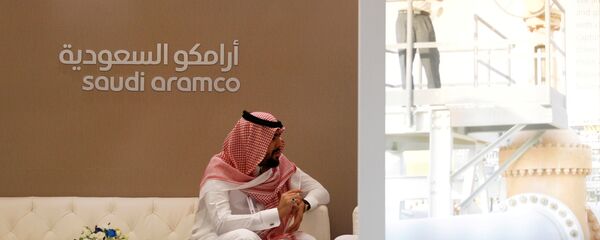Kristian Rouz — The Saudi Arabian Oil Company (Aramco) has unveiled a plan to boost non-oil sector enterprises in a bid to advance the structural reform of the Saudi economy. The move falls in line with Riyadh's plans to ease the kingdom's reliance on energy exports, while supporting business activity and consumer demand at home.
According to reports in the Saudi media Saturday, Aramco is set to offer 140 contracts to small and medium-sized enterprises (SME) worth roughly $16 bln (60 bln Saudi riyals). The energy giant is seeking contractors among Saudi-based companies in partnership with the Saudi government amid the ongoing reforms.
Aramco has already signed a Memorandum of Understanding (MoU) with the Saudi government agency known as the Authority for Small and Medium-Sized Enterprises, or Monsha'at.
"The MoU aims to enhance cooperation with the Authority in empowering small and medium enterprises in the Kingdom by improving the investment environment and providing appropriate investment opportunities for this sector, which are related to oil and gas," Aramco's deputy director of procurement and supply Mohammed bin Ayed al-Shamri said.
Aramco's increased participation in Riyadh's national development programme, known as Saudi Vision 2030, comes amid a rise in the company's operational profits. Aramco made $111 bln in profits last year due to the relatively high, stable international oil prices, as well as a substantial decline in international competition amid a decline in Venezuelan and Iranian output.
However, Aramco is facing the challenges posed by the volatility in global oil prices, as well as demand-side uncertainties in the long-run. Oil prices have garnered significant support from last year's OPEC output cuts extended into this year, but rising production in the US, and a greater prominence of renewable sources of energy, pose a concern for oil companies worldwide, Aramco being no exception.
READ MORE: Saudi Arabian Oil Giant Aramco Named World's Most Profitable Company: Here's Why
Aramco produces roughly 13 percent of the world's oil, but it finds itself under substantial pressure from shale producers in North America, as well as its old rivals, such as BP and Total. In this light, the Saudi oil giant appears to be reassessing its ties with the Saudi government, and joint ventures, such as SME contracts, could be Aramco's path to longer-term sustainability.
Increased business activity and domestic manufacturing, as well as consumer demand are expected to boost the demand for oil and natural gas within Saudi Arabia, which could over the coming years become an increasingly important market for Aramco.
International credit rating agency Moody's has said Aramco's connection to the Saudi government has restrained the investment appeal of the company's bonds. Analysts also contend that Riyadh's excessive reliance on national oil exports render it vulnerable in the face of possible disruptions in global trade, a global recession, or a rise in the use of alternative sources of energy.
Aramco insists its corporate finances are more sustainable that those of the Saudi government. Experts, however, contend that competition between international oil majors represents an additional challenge.
"We would look at it its rating against the sovereign, but there's a lot of interest from outside the emerging markets universe from investors looking at it against international oil majors from the US and Europe," Jan Dehn of London-based portfolio manager Ashmore Group said.
READ MORE: Saudi-Pakistan Oil Refinery to Augment Connectivity in Silk Road — Entrepreneur
Aramco officials also said the company is set to cooperate with Riyadh on its limited fiscal stimulus programme, which amounts to 170 bln riyals ($45.3 bln) per year to buy various services from Saudi SMEs. This might suggest different companies could provide services to Riyadh as part of Aramco-financed contracts.




